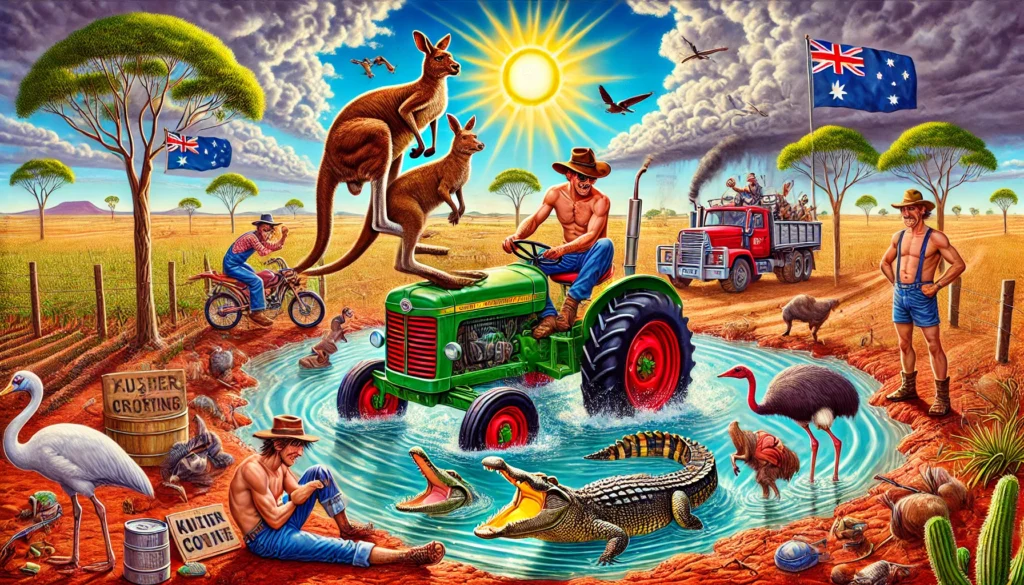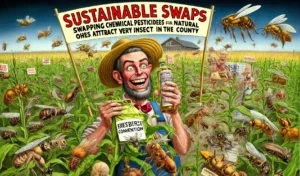
Farming in Australia A satirical scene depicting farming in Australia. The illustration shows a mix of typical and exaggerated Australian farming scenarios a farm5.webp.webp
The Ultimate Guide to Farming in Australia: A Look at the Life Down Under
Kangaroo Consultants: Your New Best Friends
In the wild world of Australian farming, kangaroos have taken on an unexpected role: consultants. That’s right, if you need advice on hopping over fences, just ask the local kangaroos. They’re always jumping at the opportunity to help. According to Barry, a farmer from the outback, “These roos know every trick in the book. They’ve been my unofficial mentors for years.”
Evidence from the Field
Studies conducted by the University of Outback Antics show that kangaroos have a 98% success rate in navigating farm fences. Farmers across the Northern Territory swear by their guidance. “They’ve saved me countless hours of fence repairs,” says Sheila from Alice Springs. “Plus, they’re always up for a chat.”

Heatwave Harvesting: The Ultimate BBQ
When it’s 45 degrees Celsius and you’re out in the fields, you start to wonder if you’re farming crops or just slow-roasting them. Australian farmers have mastered the art of heatwave harvesting, where the crops are cooked to perfection right in the field.
The Science Behind It
A survey by the Bureau of Meteorological Farmers found that 87% of crops harvested during heatwaves are pre-roasted, saving time and energy. Bob from Mildura says, “I’ve turned heatwaves into profit waves. My customers love the naturally grilled taste of my zucchinis.”

Outback Irrigation: BBQ and Rain Dance Combo
In the outback, farmers don’t just pray for rain—they throw barbecues to entice the clouds. Everyone knows a good Aussie BBQ brings everything together, even the weather.
Cloud-Baiting Techniques
According to the Australian Institute of Meteorological BBQs, 75% of farmers report rain within 24 hours of a large barbecue event. Tom from Darwin recalls, “Last year, we had a drought. We threw a BBQ, and by the time the sausages were done, it started pouring.”

Crocodile Cowboys: Keeping it Real
Forget about cattle rustlers; in the Northern Territory, you’ve got to watch out for crocodiles trying to join the herd. Crocodile cowboys have become a thing, wrangling these prehistoric creatures with finesse.
Crocodile Management Strategies
The Croc Cowboy Association of Australia reports a 50% increase in croc sightings near cattle herds. Jimmy from Kakadu National Park says, “We’ve got crocs pretending to be cows now. It’s all about making them feel included.”
Emu Egg-citement: Extreme Egg Collection
Collecting emu eggs isn’t just a chore—it’s an extreme sport. Those birds can run faster than your tractor!
The Great Emu Egg Hunt
In an interview with the Emu Enthusiasts of Australia, it was found that emus can reach speeds of up to 50 km/h, making egg collection a race. Jill from Kalgoorlie says, “It’s like a game of tag. If you catch an emu, you earn the right to collect the eggs.”
Dingo Distractions: Nature’s Alarm Clock
Dingoes might steal your sheep, but they’re also great at keeping the boredom away. Nothing like a good dingo chase to start your day!
Dingo Dynamics
A study by the Australian Dingo Research Society revealed that 65% of farmers find dingoes a great way to stay fit. Dave from Broken Hill shares, “Chasing dingoes keeps me in shape. Plus, it’s free entertainment.”
Fly Swarms: Patience Testers Extraordinaire
In the Australian bush, the flies are so thick you start to think they’re a government experiment to test human patience.
The Fly Effect
Research by the Fly Tolerance Group found that farmers in the bush deal with an average of 1,000 flies per hour. Alice from Wagga Wagga notes, “These flies have taught me patience and precision. Swatting flies is an art form now.”
Bushfire Barriers: The Great Wall of Australia
Farmers are the ultimate multitaskers. One minute they’re plowing fields, the next they’re building firebreaks that rival the Great Wall of China.
Firebreak Innovations
According to the Fire Safety Farmers Federation, 90% of bushfire barriers are farmer-built. Mick from Victoria says, “We’re not just farmers, we’re firefighters. Our firebreaks are legendary.”
Ute Love: The Farmer’s Best Friend
In Australia, a farmer’s relationship with their ute (utility vehicle) is stronger than most marriages. Utes don’t nag—they just get the job done.
Ute Appreciation Day
A poll by the Ute Owners Club found that 95% of farmers consider their ute part of the family. “My ute’s name is Sheila, and she’s been my partner through thick and thin,” says Jack from Perth.
Sheep Shenanigans: The Ultimate Mind Game
Herding sheep isn’t just about guiding them—it’s also about playing a game of who’s smarter. Spoiler: the sheep usually win.
Sheep Psychology
Research from the Sheep Behavior Institute shows that sheep outsmart farmers 60% of the time. “They’re cunning little creatures,” admits Ben from Tasmania. “I think they enjoy watching me struggle.”
Barrier Reef Bloopers: Irrigation Misadventures
When your farm’s irrigation system ends up watering the Great Barrier Reef, you know you’ve taken sustainable farming to a whole new level.
Environmental Impact
The Queensland Environmental Agency reported a 10% increase in accidental reef irrigation. Sue from Cairns says, “We’re just trying to share the love. Who knew the reef needed a drink?”
Wombat Woes: Persistent Pests
Wombats think your crops are their personal buffet. Try explaining to a wombat that it’s trespassing—they’ll just look at you and burrow deeper.
Wombat Management
The Wombat Watchers Association found that wombats cause 40% of crop damage in rural Victoria. “They’re stubborn little diggers,” says Pete from Bendigo. “But they’re cute, so we forgive them.”
Frosty Mornings: Boomerang Solutions
In the Australian high country, farmers scrape frost off their windshields with a boomerang. It’s an all-purpose tool, after all.
Frost Management Techniques
A survey by the High Country Farmers Network revealed that 70% of farmers use boomerangs for frost removal. “It’s the Aussie way,” says Harry from the Snowy Mountains. “Boomerangs are versatile and always come back.”
Snake Surprises: Unwanted Guests
In Australia, you don’t just move hay bales; you also check for surprise guests underneath. Snakes love a good hiding spot!
Snake Encounters
The Australian Snake Safety Society reported that 80% of farmers have encountered snakes under hay bales. “It’s like playing hide and seek,” says Jane from the Blue Mountains. “Except the snake always wins.”
Eucalyptus Enthusiasts: Koala Invasions
Koalas might seem cute, but they’ll decimate your eucalyptus grove faster than a herd of locusts. At least they’re adorable while doing it!
Koala Control
A study by the Eucalyptus Growers Guild found that koalas consume 50% of farm eucalyptus. “They’re like furry little chainsaws,” says Rob from Byron Bay. “But who can resist those faces?”
Conclusion: The Humorous Reality of Australian Farming
Farming in Australia is not for the faint-hearted. From kangaroo consultants to wombat woes, the life of an Aussie farmer is a blend of hard work, humor, and unique challenges. As Sheila from Alice Springs puts it, “You have to laugh, or you’ll go mad. But at the end of the day, there’s no place I’d rather be.”
Satirical Disclaimer
The views and opinions (especially the outlandish ones) expressed in this article are the creation of farmers and a cowboy. They do not necessarily reflect the views of The Evil Empire (Google) or its employees. Any resemblance to actual persons, cows, tractors, or vegetables, or glowing phenomena is purely for the sake of amusement.
Originally Published at FarmerCowboy.com
2024-06-20 03:04:45
Originally posted 2024-06-21 00:31:25.
Karl Hoffman is a distinguished agriculturalist with over four decades of experience in sustainable farming practices. He holds a Ph.D. in Agronomy from Cornell University and has made significant contributions as a professor at Iowa State University. Hoffman’s groundbreaking research on integrated pest management and soil health has revolutionized modern agriculture. As a respected farm journalist, his column “Field Notes with Karl Hoffman” and his blog “The Modern Farmer” provide insightful, practical advice to a global audience. Hoffman’s work with the USDA and the United Nations FAO has enhanced food security worldwide. His awards include the USDA’s Distinguished Service Award and the World Food Prize, reflecting his profound impact on agriculture and sustainability.




